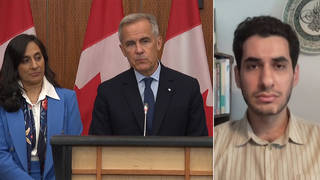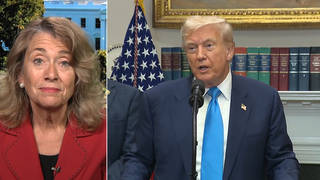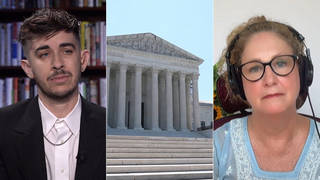
Guests
- Ro KhannaDemocratic congressmember from California and deputy whip of the Congressional Progressive Caucus.
We speak with Democratic Congressmember Ro Khanna of California about several topics. He has reintroduced a bill in the House to limit Supreme Court justices to 18-year terms, which he says would help rebalance the high court, now dominated by a 6-3 conservative majority, and is especially needed after several controversial Supreme Court rulings striking down President Biden’s student debt relief plan, giving businesses the right to discriminate against LGBTQ people on religious grounds, rolling back environmental protections and more. “Most Americans have seen that the Supreme Court is just wildly out of touch with the facts of modern life,” he says. Khanna also talks about his lone vote against the Pentagon budget, and he responds to critics of the key role he played in welcoming Indian Prime Minister Narendra Modi for a state visit at the White House, which was roundly condemned by human rights advocates, given Modi’s track record of violence and bigotry.
Transcript
AMY GOODMAN: This is Democracy Now!, democracynow.org, The War and Peace Report. I’m Amy Goodman, with Nermeen Shaikh, as we spend the rest of the hour with Democratic Congressmember Ro Khanna, who has several topics to discuss with us.
Congressmember, thanks so much for being with us, joining us, though you represent California, from Charleston, South Carolina. We want to start with your introduction of a bill to limit Supreme Court justices to 18-year terms. What are you calling for?
REP. RO KHANNA: Amy, most Americans have seen that the Supreme Court is just wildly out of touch with the facts of modern life. They’re taking away rights from women. They are penalizing students who are poor. They are making campuses less diverse. They’re rolling back environmental legislation. So what we are saying is, let’s have term limits on these justices. Every president gets two appointments. The justices get 18 years. And then they can go serve on a lower court, so they remain a judge for life under the Constitution.
AMY GOODMAN: And what about the number of Supreme Court justices one president can choose? I’ve heard the number two. You know, Trump chose three, of course.
REP. RO KHANNA: Exactly. Every president would get two appointments. And so, this would prevent something like the Merrick Garland situation, which has cast such illegitimacy on the court, where Mitch McConnell just blocked President Obama from picking someone, and then expedited the process for Trump to get three appointments. Now every president would get an appointment, two appointments, in their four-year term.
AMY GOODMAN: And, Congressmember, can you also talk about being the sole person — I think it was 58 to 1 — on the House Armed Services Committee to vote “no” on the new Pentagon budget?
REP. RO KHANNA: Well, Amy, it’s not a distinction that I want. I wish more of my colleagues would recognize what is so obvious to many Americans, that you have a bloated Pentagon budget. Defense contractors are making extraordinary profits, having goods sold to the American public at 1,000, 10,000% inflation. And we need to tackle that. So, the money is not just going to troops. It’s not just going to national security. It’s lining the pockets of many of these defense executives. And we’re approaching almost a trillion-dollar defense budget. It’s nearly 56% of discretionary income. I rather that we be investing some of that money in our schools here at home, in creating good jobs here at home, in helping the working class.
AMY GOODMAN: I also wanted to ask you about the visit of Prime Minister Modi. President Biden welcomed the Indian prime minister to the White House, praising a new era in U.S.-India relations, the trip roundly condemned by human rights advocates. At least five Democratic lawmakers announced plans to boycott Modi’s joint address to Congress, including Alexandria Ocasio-Cortez, Ilhan Omar, Rashida Tlaib, Cori Bush, Jamaal Bowman. In a post on social media, Congressmember Tlaib wrote, “It’s shameful that Modi has been given a platform at our nation’s capital—his long history of human rights abuses, anti-democratic actions, targeting Muslims & religious minorities, and censoring journalists is unacceptable,” she said. More than 70 Democrats in the House and Senate also signed a letter urging Biden to focus on human rights in talks with Modi.
Congressmember Khanna, many in the progressive community were surprised to learn you were not only in favor of Modi addressing a joint session of Congress and Biden welcoming Modi with a rare state dinner, one of the highest diplomatic honors bestowed on a foreign leader, but you were a major engine for this. Amit Shrivastava wrote in Truthout, “Why did Rep. Khanna, who positions himself as a progressive, choose to invite Modi in spite of the prime minister and the BJP’s track record of violence and bigotry — especially at a moment when the Uttarakhand and Manipur violence was escalating? The answer lies in the U.S.-India defense partnership and the drive toward war… It is clear that in the context of a growing cold war with China and Russia, the West had decided that it is time to draw India in, even if it means playing to the megalomania of an authoritarian leader.” Your response, Congressmember Khanna?
REP. RO KHANNA: Well, it’s a fair question. I believe that the prime minister is an elected leader of 1.4 billion people, and the way to make progress on human rights is to engage with the Indian prime minister. I also am sensitive that India is two generations removed from colonialism. My grandfather, as you know, spent years in jail under British colonialism and then was part of the Congress Party advocating for pluralism. So, the idea that India is going to respond simply by being lectured from the West is not going to work.
And my view is similar to Fareed Zakaria’s or President Obama’s, that we have to engage India, a rising democracy and ally, though they have problems, and then have a conversation about the challenge of multiracial, multiethnic democracy. And that means respecting minority rights. It means making sure that Sikhs, Muslims, Christians all are treated equally, and having those candid conversations with the prime minister and others, as I did when I had the opportunity to meet the prime minister. But to simply boycott a country that has chosen to elect their own leader, I think, would be a mistake and not actually advance human rights in India.
AMY GOODMAN: According to The Nation, you received more than $110,000 from Hindu nationalist figures in the United States. Your response?
REP. RO KHANNA: Well, we raise millions of dollars online. There are many Indian Americans who contribute to our campaign, many Pakistani Americans who contribute to our campaign. I don’t ask their view on Indian politics when they’re contributing. But certainly, I have gone out of my way to criticize right-wing nationalism in India, to stand up for pluralism, and even have, in the last two election cycles, had a challenger who has been supported by some of the extreme elements because they didn’t like my stance on pluralism.
AMY GOODMAN: Well, I want to thank you for being with us, Congressmember Ro Khanna, Democratic congressmember from California, deputy whip of the Congressional Progressive Caucus, just recently voted “no” on the Pentagon budget, the sole voice in the Armed Services Committee. The vote was 58 to 1, that vote from Ro Khanna.
That does it for our show. Democracy Now! is produced with Renée Feltz, Mike Burke, Deena Guzder, Messiah Rhodes, María Taracena, Tami Woronoff, Charina Nadura, Sam Alcoff, Tey-Marie Astudillo, John Hamilton, Robby Karran, Hany Massoud and Sonyi Lopez. Our executive director, Julie Crosby. Special thanks to Becca Staley, Jon Randolph, Paul Powell, Mike Di Filippo, Miguel Nogueira, Hugh Gran, Denis Moynihan, David Prude and Dennis McCormick. To see our interviews and video and audio podcasts, you can go to democracynow.org and sign up there for our daily news digest. I’m Amy Goodman, with Nermeen Shaikh. Thanks so much for joining us.













Media Options